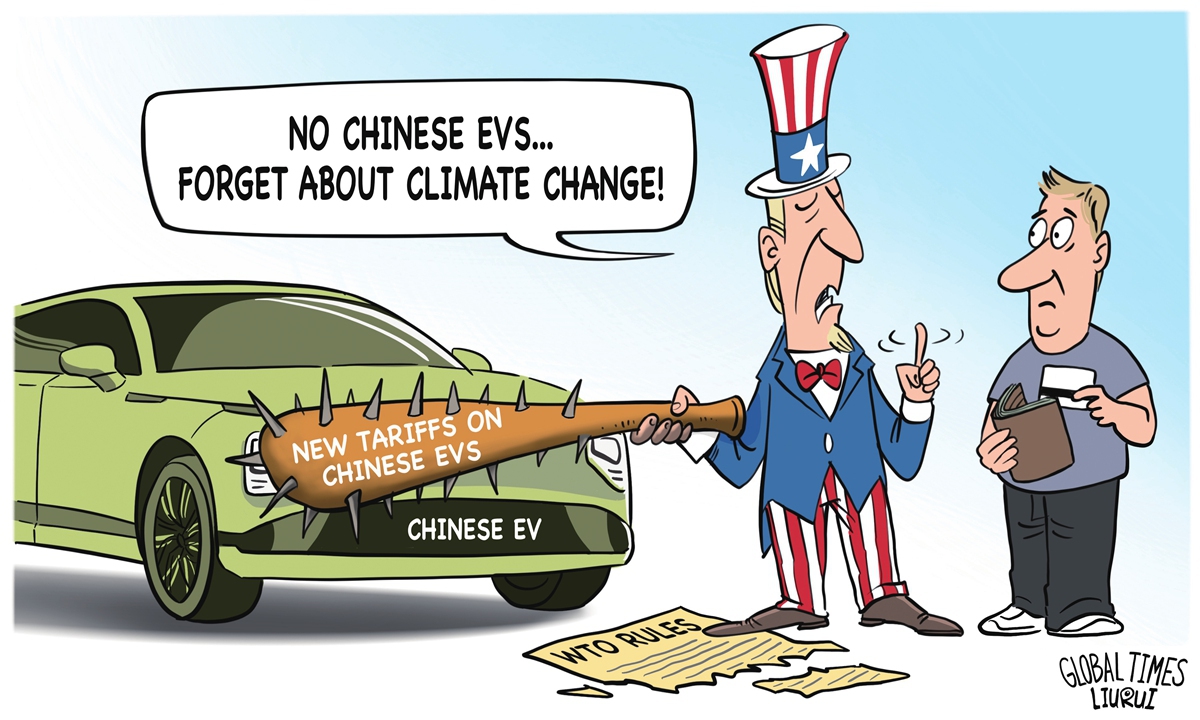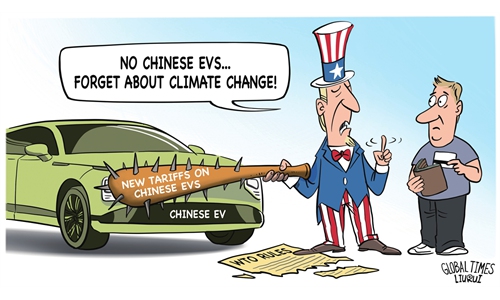New US tariffs on China seriously hurt global environmental protection: Global Times editorial

Abusing tariffs. Illustration: Liu Rui/GT
The recent increase in tariffs imposed by the US on imports from China, particularly on electric vehicles (EVs), lithium batteries, and semiconductors, has sparked criticism globally. Not only did the International Monetary Fund (IMF) spokesperson criticize the move, saying it "can distort trade and investment, and fragment supply chains," several US media, including The Washington Post, also slammed that the new tariffs raise costs for companies using green energy devices and make electric vehicles less affordable for US consumers.
"Forcing consumers, via tariffs, to subsidize domestic clean energy companies that are far from the cutting edge of technology is an economic and environmental loser," The Washington Post article said. Colorado Governor Jared Polis also stated that the new tariffs are "a major setback for clean energy."
The concerns are far-sighted and realistic. The new tariffs represent another escalation of the US' policy to contain China in recent years, forcing its companies to restructure supply and industrial chains, and disrupting the normal global trade order. This restructuring will have a profound negative impact on the global industrial system centered around emission reduction goals, leading to serious environmental issues worldwide.
It should be pointed out that the timing of the new US tariffs coincides with a critical moment in the global transition from traditional to new energy and the construction of a global green economy. On April 17, Dubai, a country located in a desert region, experienced a sudden downpour, with one day's rainfall equivalent to half the average annual rainfall.
This most severe rainstorm in 75 years caused Dubai International Airport to close for three days. Extreme heat waves, severe cold, torrential rains, hurricanes, droughts and floods... the increasingly frequent extreme weather events highlight the urgency of global efforts to address climate change to a degree felt by everyone.
At the beginning of this year, the World Meteorological Organization released a report officially confirming 2023 as the warmest year on record. The report indicates that new record-high levels were set in 2023 for all three of the main greenhouse gases. Carbon dioxide levels are 50 percent higher than in the pre-industrial era.
According to a report released by the United Nations Environment Programme at the end of last year, predicted 2030 greenhouse gas emissions still must fall by 28 percent for the Paris Agreement 2 C pathway and 42 percent for the 1.5 C pathway.
Against this backdrop, it has become a widespread consensus in the international community to achieve effective emission reduction and build a new form of sustainable economic development for humanity by significantly adjusting the energy structure, especially by promoting the widespread use of new energy products to achieve low-carbon emissions. It is precisely for this reason that China's "new three" products have been widely welcomed in markets around the world.
Data shows that in 2023, China contributed more than half of the global renewable energy installed capacity of 510 million kilowatts. In 2022, China's renewable energy generation contributed to a reduction of approximately 2.26 billion tons in domestic CO2 emissions, while exports of wind power and solar products aided other nations in decreasing CO2 emissions by an additional 573 million tons.
The two figures add up to 2.83 billion tonnes of emissions reduction, or about 41 percent of the global total of carbon emissions reduction due to renewable energy.
At the World Energy Congress held in April, Amin Nasser, CEO of Saudi Aramco, one of the world's largest oil companies, said that "China has made these green products so affordable, and they will help the West achieve its target of cutting carbon emissions to a net zero level by 2050." Imagine what the global energy transition would look like without China's green production capacity, and how it would impact humanity's ability to address climate change.
Especially for developing countries, it is China's progress in the field of new energy that allows them to purchase more cost-effective EVs, lithium batteries, and photovoltaic products. The report from the International Renewable Energy Agency pointed out that in the past 10 years, the average cost of wind and photovoltaic power generation projects globally has cumulatively decreased by over 60 percent and 80 percent, respectively, with a large part of it attributed to Chinese innovation, manufacturing, and engineering. In this sense, the development and progress of China's new energy industry are not only accelerators of the global energy transition, but also the vanguard of humanity's response to climate change. This represents not only high-quality and advanced production capacity, but also widespread development justice.
There is only one Earth, and all countries share the same planet. Responding to global climate change and promoting energy transition in various countries is a task filled with both difficulties and hope. It requires a true spirit of "working together for the world" from all countries, as well as the joint maintenance of an open and fair international economic system. Nowadays, some people in the US, out of short-sighted and narrow political motives and fragile anxiety, are waving a big stick in the field of tariffs, undoubtedly weakening the cohesion of countries and their ability to respond to climate change, damaging the positive prospects of global green transformation.
This will also be a "protectionist disaster" for humanity. It is hoped that they will wake up soon!

